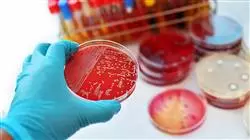University certificate
The world's largest faculty of pharmacy”
Why study at TECH?
As a pharmacist, you should update your knowledge in Antimicrobial Resistance and Correct Use of Antibiotics. That is what you will be able to achieve with this TECH"

Infectious diseases continue to be the main cause of death and work impairment (reduction of productive life period) in the world. In 2016, of the total 56.4 million deaths worldwide, 33% were due to infectious diseases, 30% to cardiovascular diseases and 10% to cancer. The fight against disease has two simultaneous fronts: infectious diseases and chronic non-communicable diseases.
The fact that these factors interact with each other has conditioned us to not consider any part of the planet as isolated from the rest, and to look upon the appearance, reappearance or dissemination of imported or apparently eradicated infectious diseases in our environment as possibilities.
The complex epidemiological situation that the world has witnessed so far this century, has been exemplified by the deliberate release of Bacillus anthracis spores as a weapon of bio-terrorism to cause pulmonary anthrax in victims who inhaled them, the emergence of West Nile virus as a pathogen in the United States, the epidemic of Severe Acute Respiratory Syndrome (SARS), the zoonotic spread of monkeypox in the United States, the threat of pandemic influenza, the Ebola epidemic in Africa, the emergence of yellow fever cases in Angola, coupled with the re-emergence of dengue and cholera; the emergence of new arboviruses in the Americas region, such as Chikingunya and more recently Zika, together with morbidity from other endemic infectious diseases such as HIV/AIDS, leptospirosis, tuberculosis, community-acquired pneumonia and the increase in antibiotic resistance with the development of multidrug-resistant bacteria; all of which highlight the unprecedented need to improve the training and development process with human capital in order to increase the competence and performance levels of pharmaceutical personnel required to meet the challenges involved in controlling and dealing with biological, hospital and public health emergencies that will guarantee the quality and safety of health care for the population in any part of the world.
Improve your pharmaceutical skills through this comprehensive program that will help you understand how antimicrobial resistance works"
This Postgraduate certificate in Antimicrobial Resistance and Correct Use of Antibiotics contains the most complete and up-to-date program on the market.
Its most outstanding features are:
- Clinical cases presented by experts in Antimicrobial Resistance
and Correct Use of Antibiotics - Graphic, schematic, and practical contents created in order to provide scientific and practical information on those disciplines that are essential for professional practice
- Latest developments in Antimicrobial Resistance and Correct Use of Antibiotics
- Practical exercises where self-assessment can be used to improve learning
- An algorithm-based interactive learning system for decision-making in the clinical situations presented throughout the course
- Theoretical lessons, questions to the expert, debate forums on controversial topics, and individual reflection assignments
- Content that is accessible from any fixed or portable device with an Internet connection
This Postgraduate certificate is the best investment you can make in your education for two reasons: you will earn a Postgraduate certificate from the largest digital university in the world, TECH, and you will acquire the best and most up-to-date training in in TECH
Its teaching staff is made up of prestigious and renowned professionals from pharmaceutical and medical disciplines who have long had careers in health care, teaching and research, and have worked in many countries on several continents developing professional and teaching experience that they deliver in an extraordinary way in this course.
The methodological design of this program, carried out by a multidisciplinary team of e-Learning experts, integrates the latest advances in educational technology to produce a variety of educational multimedia tools that are based primarily on the problem-based learning method, and will allow professionals to address real problems in their daily clinical practice by helping them acquire further knowledge and develop more skills.
Each of the contents generated, as well as course videos, self-evaluations, clinical cases and exams, have been thoroughly reviewed, updated, and integrated by the teaching staff and team of experts that make up the faculty, in order to facilitate the learning process with a step-by-step approach and to help students reach course objectives.
This fully up-to-date program is the best of its kind in the educational landscape for viral infections, from a pharmaceutical perspective"

Don't miss this opportunity to get up to date on the latest advances in antimicrobial resistance treatments and incorporate them into your daily pharmaceutical practice"
Syllabus
The teaching program has been designed by a group of professors and professionals from different medical specialties with extensive medical, research and teaching experience in several countries in Africa, Central and South America, and interested integrating the latest and most current scientific knowledge of clinical infectiology and antimicrobial therapeutics, in order to ensure that the training and professional development offered helps those who care for patients or populations with infectious diseases improve in their daily practice.

This Postgraduate certificate in Antimicrobial Resistance and Correct Use of Antibiotics contains the most complete and up-to-date program on the market”
Module 1. Antimicrobial Resistance
1.1. Epidemiology. From Molecular to Socioeconomic
1.1.1. Analysis of Molecular Evolution, Genetics, Clinical Manifestation, Epidemiology and Socioeconomics of the Resistance to Antibiotics
1.1.2. Mortality Due to Super Bacteria
1.1.3. Most Lethal Super Bacteria
1.2. Mechanisms of Antimicrobial Resistance
1.2.1. Genetic Mechanisms
1.2.2. Acquired Mechanisms
1.3. MRSA and GISA
1.3.1. Epidemiology
1.3.2. Resistance Mechanisms
1.3.3. Alternative Treatments
1.4. Resistant Enterobacteria
1.4.1. Epidemiology
1.4.2. Resistance Mechanisms
1.4.3. Alternative Treatments
1.5. Resistant Pneumococcus
1.5.1. Epidemiology
1.5.2. Resistance Mechanisms
1.5.3. Alternative Treatments
1.6. Viral Resistance
1.6.1. Epidemiology
1.6.2. Resistance Mechanisms
1.6.3. Alternative Treatments
1.7. Mycotic and Parasitic Resistance
1.7.1. Epidemiology
1.7.2. Resistance Mechanisms
1.7.3. Alternative Treatments
1.8. Worldwide Program for the Control of Antimicrobial Resistance and Research into New Antibiotics
1.8.1. Objectives and Action of the Worldwide Program for the Control of Antimicrobial Resistance
1.8.2. Research into New Antibiotics for Multiresistant Germs
1.8.3. Emergence of Other Forms of Treatment for Infection Control
Module 2. The Correct Use of Antimicrobials
2.1. Basic Principles in the Selection and Use of Antimicrobials
2.1.1. Elements of an Antimicrobial
2.1.2. Elements of a Germ
2.1.3. Elements of the Host
2.2. Use of Antimicrobials in Special Situations in the Host
2.2.1. Use in Kidney Failure
2.2.2. Use in Pregnancy
2.2.3. Use in Liver Failure
2.3. The Role of Policies and Programs for Rational Use of Antibiotics; their Impact on Antimicrobial Resistance and on the Cost of Medical Care
2.3.1. Situation of Programs and Policies for the Rational Use of Antibiotics
2.3.2. Impact of Programs and Policies in the Use of Antibiotics
2.3.3. Use of Clinical Practice Guides
2.4. Pharmotherapeutic Committees as Tools for the Control and Evaluation of the Use of Antibiotics
2.4.1. Structure
2.4.2. Objectives
2.4.3. Functions
2.4.4. Impact Results
2.5. Antibiotic Prophylaxis in Surgery
2.5.1. Classification of Surgical Interventions
2.5.2. Uses of Antibiotic Prophylaxis According to the Type of Surgical Intervention
2.5.3. Most Commonly Used Schemes of Antibiotic Prophylaxis in Surgery
2.6. Reasoned Therapeutics in the Use of Antibiotics
2.6.1. Stages of Reasoned Therapeutics
2.6.2. Importance of Reasoned Therapeutics
2.7. The Worldwide Experience in the Control of the Use of Antibiotics
2.7.1. Main Worldwide Experiences in the Control of the Use of Antibiotics

A unique specializacion program that will allow you to acquire advanced training in this field"
Postgraduate Certificate in Antimicrobial Resistance and the Correct Use of Antibiotics
Antimicrobial resistance (AMR) is a global public health problem accelerated by the misuse of antibiotics. Here, it is essential that healthcare workers implement measures to combat AMR and ensure the correct use of antibiotics. Education and awareness are key to prevent the spread of this problem and preserve the effectiveness of antibiotics. At TECH Global University we developed the Postgraduate Certificate in Antimicrobial Resistance and Correct Use of Antibiotics, a 100% online Postgraduate Certificate, through which you will learn the most fundamental aspects of this health field. The curricular contents proposed in the curriculum range from national and international policies on the use of antimicrobials and how they affect clinical practice, to current research in AMR and how they can contribute to the fight against antimicrobial resistance through research and education.
Learn all about antimicrobial resistance and the correct use of antibiotics.
Antimicrobial resistance (AMR) is a phenomenon that has increased considerably over the years. Currently, the joint work of healthcare personnel has facilitated the implementation of measures to combat AMR and ensure the correct use of antibiotics. Through our educational outline, you will be introduced to antimicrobial resistance and its impact on public health, ways to minimize exposure to antimicrobial agents and the most recent findings in AMR research. Likewise, you will learn about the different types of bacteria, viruses and fungi and how they resist antimicrobial drugs. With this new knowledge, you will be able to identify infections and ways to treat them appropriately to avoid antibiotic resistance.







